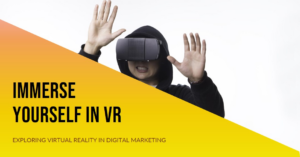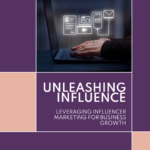Introduction:
In the ever-evolving landscape of digital marketing, brands are constantly seeking innovative ways to captivate audiences, differentiate themselves from competitors, and deliver memorable experiences that leave a lasting impression. Enter virtual reality (VR) – a cutting-edge technology that offers unparalleled opportunities for immersive storytelling, interactive engagement, and brand experiences that transcend the boundaries of the physical world. In this guide, we embark on a journey into the world of virtual reality in digital marketing, uncovering the transformative potential of VR and exploring how brands can harness its power to connect with their audience in new and impactful ways.

1. Immersive Brand Experiences:
At the heart of virtual reality in digital marketing lies the promise of immersive brand experiences that transport users to virtual worlds, allowing them to explore, interact, and engage with brands in unprecedented ways. Whether it’s touring a virtual showroom, experiencing a product demonstration in 3D, or embarking on a virtual adventure that brings the brand’s story to life, VR offers brands the opportunity to create memorable experiences that resonate with their audience and leave a lasting impression.
By leveraging VR technology, brands can break free from the constraints of traditional marketing channels and connect with their audience on a deeper, more emotional level. From luxury retailers offering virtual fashion shows to travel brands providing virtual tours of exotic destinations, VR enables brands to deliver experiences that evoke wonder, excitement, and awe, fostering a sense of connection and affinity that extends far beyond the digital realm.
2. Interactive Storytelling:
Virtual reality unlocks new possibilities for interactive storytelling, allowing brands to engage audiences in dynamic narratives that unfold in real-time based on user actions and decisions. Whether it’s solving puzzles, exploring hidden secrets, or embarking on epic quests, VR experiences enable brands to captivate audiences with immersive narratives that invite active participation and engagement.
By incorporating elements of gamification, interactivity, and user choice into VR experiences, brands can create compelling narratives that resonate with their audience and drive meaningful engagement. Whether it’s a branded adventure game, an interactive product demo, or a virtual reality escape room, VR storytelling offers brands the opportunity to create memorable experiences that captivate, educate, and inspire their audience in new and innovative ways.
3. Virtual Product Experiences:
For brands selling physical products, virtual reality offers a unique opportunity to showcase products in a virtual environment, allowing users to interact with them in ways that mimic real-world experiences. Whether it’s test-driving a car, trying on virtual clothing, or exploring the features of a new gadget, VR product experiences enable brands to provide customers with a hands-on preview of their offerings before making a purchase.
By leveraging VR technology, brands can overcome the limitations of traditional product demonstrations and provide customers with a more immersive and engaging shopping experience. Whether it’s customizing product options, exploring different configurations, or visualizing products in various environments, VR enables brands to empower customers with the information and confidence they need to make informed purchasing decisions.
4. Virtual Events and Experiential Marketing:
In the wake of the COVID-19 pandemic, virtual events and experiential marketing have emerged as essential components of brands’ marketing strategies, enabling them to connect with audiences in a socially distanced world. Virtual reality offers brands the opportunity to take virtual events to the next level, creating immersive experiences that rival the excitement and energy of in-person gatherings.
Whether it’s hosting a virtual conference, organizing a virtual product launch, or staging a virtual brand activation, VR enables brands to engage audiences in dynamic and interactive experiences that transcend the limitations of traditional online events. By leveraging VR technology, brands can create memorable and impactful experiences that foster connections, drive engagement, and leave a lasting impression on attendees.
Conclusion:
Virtual reality represents a new frontier in digital marketing, offering brands unprecedented opportunities to create immersive experiences that captivate, engage, and inspire their audience in ways previously unimaginable. Whether it’s through immersive brand experiences, interactive storytelling, virtual product experiences, or virtual events and experiential marketing, VR enables brands to connect with their audience on a deeper, more emotional level, fostering relationships that extend far beyond the digital realm.
As brands continue to explore the possibilities of virtual reality in digital marketing, the potential for innovation and creativity is limitless. By embracing VR technology and harnessing its power to create memorable and impactful experiences, brands can differentiate themselves from competitors, forge meaningful connections with their audience, and drive sustainable growth and success in the ever-evolving landscape of digital marketing.



